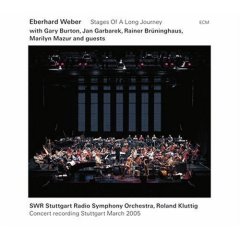Review by Brad Walseth
Not unlike the late Max Roach, whose brilliance elevated the drum kit to the level of the saxophone and piano in jazz ensembles, Eberhard Weber has been an important actor in attempting to raise the bass to an equal footing in jazz as well. Following the lead of players like Slam Stewart and Charles Mingus, virtuostic bassists like Weber, Miroslav Vitous, Stanley Clarke and Jaco Pastorius began forcing what had been often simply a supporting instrument into a leading role. Their efforts has led to the emergence of successful current players like Victor Wooten and John Patitucci who are no longer content to treat the bass as a 2nd class instrument merely existing to provide a low-end tonic/fifth "base."
On the occasion of Eberhard Weber’s 65th birthday, the city of Stuttgart, Germany threw a party/concert for one of its favorite sons. Backed by the SWR Stuttgart Radio Symphony Orchestra, and accompanied by some of the musicians who have accompanied the iconic bassist over the years — including vibraphonist Gary Burton, and saxophonist Jan Garabeck, Weber personally selected a program of compositions from throughout his long and varied career for this exceptional recording that blends elements of jazz (primarily improvisation) with timbre-rich European classical music.
For those not familiar with Weber, perhaps the primary distinguishing feature of the artist is the sound of his bass. Custom built to Weber’s specifications and design, the instrument is a hybrid of electric and acoustic elements: a solid body with 5-strings (and extra treble-C) and while it exhibits the warmth of an acoustic, it also is clear and bright in tone — truly the best of both worlds, and a tonality that allows the bass to be heard clearly live. Of course, the flavor of sound would be irrelevant if the playing wasn’t so superb. Weber mixes solid technique from his days as a classical cellist with funky, African rhythms, and has been known keep audiences enthralled at solo concerts where he will play a rhythmic line, loop it, play a harmonic counterpoint, loop it and then solo over the top. Weber’s compositions range from utilizing electronics to moody Third Stream orchestrations, often displaying a bittersweet current running through them.
A perfect example of Weber’s work is "Silent Feet" which opens "Stages of a Long Journey." Inspired by Richard Adams’ "Watership Down," this folksy piece bounces along almost merrily, yet there is an ominous and unsettling unseen presence felt that reminds one of the tenuous frailty of existence the rabbits experience in the novel. Burton, Garabeck and percussionist Marilyn Mazur shine here, but it is the subtly layered orchestrations that are most memorable.
Carla Bley’s "Syndrome" follows and moves into a bit more standard jazz fare (if you can call any of Bley’s unconventional work that – this one does seem to be blues-based). Burton gives his usual brilliant solo turn, before long-time Weber bandmate pianist Rainer Brüninghaus, Europe’s favorite sax veteran Garabek and the talented Ms. Mazur solo nicely over Weber’s immensely creative walking/galloping bass lines that hearken back to Mingus muscular work on the board. A duet with former pianist Wolfgang Dauner on the Jerome Kern standard "Yesterdays" is satisfyingly emotive, and serves as a prelude into the rest of the concert, which focuses more on Weber’s own impressive catalog of compositions.
"Seven Movements" is a wonderful duet between Weber and Garabeck in which Weber's lustrous Middle-Eastern bass riffs, ostinados and chords are answered by Garabeck's melancholy soprano sax lines.
"The Birthday Suite" brings together some of Weber's most expressive work, beginning with the powerful and astonishing "The Colours of Chloe" - one of Weber's best loved works, which moves gracefully through moods heightened by the swirling orchestral atmospheres. Burton and Weber especially sparkle here, along with Garabeck, who plays with a touch more fire than in his usual icicles of soprano sound. "Chloe" moves nicely into “Piano Transition,” played with skill and verve by Brüninghaus and based on is own “Solo Piano Suite.”
The compelling "Maurizius" follows within the suite and reminds one of some Phillip Glass' more melodic work, although much thicker and more organic sounding. Garabeck makes his soprano cry crystaline tears as he skates across the frozen river of music created and chilled by an orchestra commisioned by the Mountain King, while Burton's mallets engender twinkling snowflakes over the landscape.
Marilyn Mazur's melodic rhythm interlude — "Percussion Transition" leads nicely into a lovely rendition of Weber's "Yellow Fields," where the entire band and orchestra are completely locked in and completely in tune with one another. Meanwhile, a short and delightful trio ("Hang Around") between the bassist and Reto Weber (no relation) on "hang" — a percussion instrument of his own devise, and Nino G on beatbox, shows that not only is Weber in touch with modern music, but also shows that the bassist can get down and get funky with the best of them his surprisingly energetic and entertaining West African bass riffing.
But the album finishes up with the tremendous title cut — "The Last Stage of a Long Journey" and everyone involved is completely in sync in presenting this 11:06 romantic magnum opus, that moves along bittersweetly as though paging through stages/ remembrances of a life full of experiences both joyful and sad. This shimmering and cinematic composition brings many of Weber's best features to bear, the orchestral tones form a subdued yet magnetic palette, and soloists Garabeck and Burton play with a focus
that donates sincere respect for the composer and bandleader.
Weber finishes up with a brief solo turn on "Air," where he plays with considerable technique, yet eschews grandstanding in service to the melody, a most apt way of ending this rewarding recording.
|

